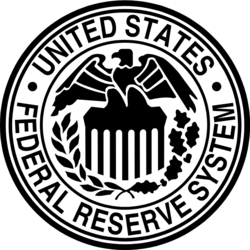Difference between revisions of "US/Federal Reserve"
(expand and add ON) |
(link to petrodollar) |
||
| Line 11: | Line 11: | ||
==Profits== | ==Profits== | ||
| − | Charging interest on all the [[United States dollar]]s in existence is a pretty lucrative affair... | + | Charging interest on all the [[United States dollar]]s in existence is a pretty lucrative affair... not least because the [[petrodollar]] policy which made the US dollar the world's reserve currency. |
{{SMWDocs}} | {{SMWDocs}} | ||
{{Stub}} | {{Stub}} | ||
Revision as of 17:29, 13 January 2015
 | |
| Formation | December 23, 1913 |
| Interest of | Charles August Lindbergh |
| Subpage | •US/Federal Reserve/Chair •US/Federal Reserve/New York •US/Federal Reserve/Vice Chair |
| The privately held cartel which profits of the US$ monopoly. It was set up by a group of large financiers on December 23, 1913 after the failure of earlier privatisations by stealth of the US money supply. | |
Official narrative
The public at large is encouraged to overlook the fact that this is a private business that was set up by Wall St. bankers, and much is made of the token (irrelevant) public elements.
Profits
Charging interest on all the United States dollars in existence is a pretty lucrative affair... not least because the petrodollar policy which made the US dollar the world's reserve currency.
Related Quotations
| Page | Quote | Author | Date |
|---|---|---|---|
| Louis McFadden | “Mr. Chairman, we have in this country one of the most corrupt institutions the world has ever known. I refer to the Federal Reserve Board and the Federal reserve banks. The Federal Reserve Board, a Government board, has cheated the Government of the United States out of enough money to pay the national debt. The depredations and the iniquities of the Federal Reserve Board and the Federal reserve banks acting together have cost this country enough money to pay the national debt several times over. This evil institution has impoverished and ruined the people of the United States; has bankrupted itself, and has practically bankrupted our Government. It has done this through defects of the law under which it operates, through the maladministration of that law by the Federal Reserve Board and through the corrupt practices of the moneyed vultures who control it. From the Atlantic to the Pacific our country has been ravaged and laid waste by the evil practices of the Federal Reserve Board and the Federal Reserve banks and the interests which control them … This is an era of economic misery, and for the conditions that caused that misery, the Federal Reserve Board and the Federal Reserve banks are fully liable. | Louis McFadden | 1934 |
| Paul Volcker | “In 1952, straight from the London School of Economics, Volcker joined the Federal Reserve Bank of New York as an economist. He stayed for five years, until 1957, at which time Volcker moved from Liberty Street to become an economist for Chase Manhattan Bank, where he stayed for four years, until 1961. In 1961, Volcker went to the Treasury Department in Washington, thus completing the first round of his three stop "revolving door." Appointed as Deputy Undersecretary for Monetary Affairs, he held that job just long enough to learn the ropes in Washington, and returned to New York, to Chase Manhattan Bank, as Vice President in charge of Planning. After three years in that post, Volcker left in 1969 to become Undersecretary for Monetary Affairs at the U. S. Treasury Department. After five years, Volcker completed the second round of his "revolving door" with an appointment as President of the Federal Reserve Bank of New York.
Volcker is also a member of the Council on Foreign Relations, the Rockefeller Foundation and the American Friends of the London School of Economics. If Paul Volcker was a solitary phenomenon, we could make no case for Trilateral control of the Federal Reserve System. In fact, the Volcker phenomenon is one of a dozen parallel situations.” | Paul Volcker Antony Sutton |
Related Document
| Title | Type | Publication date | Author(s) | Description |
|---|---|---|---|---|
| File:The Federal Reserve conspiracy by Antony C Sutton.pdf | book | Antony Sutton | Historical perspectives on the money trust including critique of Karl Marx |